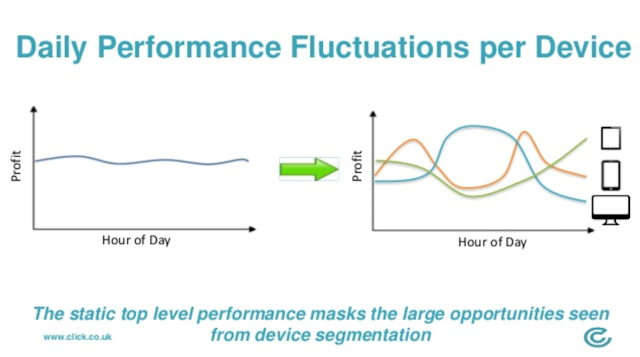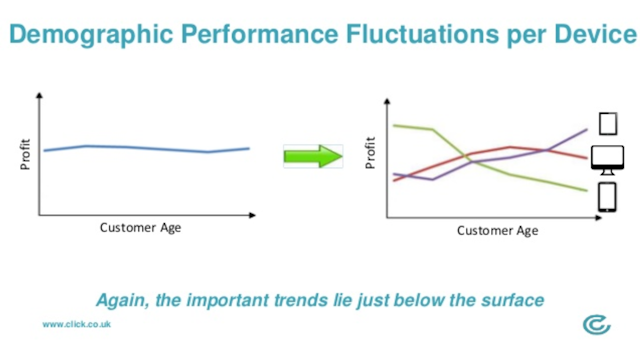Benchmark search conference 2017 uncovers the method behind storytelling and the value of data innovation
Following the success of 2016's Benchmark search conference, search marketing agency Click Consult welcomed a dozen marketing experts from an array of business backgrounds last month (21 September) to share their expertise on search marketing topics.

Benchmark search conference 2017 uncovers the method behind storytelling and the value of data innovation
This year, the subjects ranged from the intricacies of Excel to the growing bond between creativity and data. Here we elaborate on the relationship, pinpoint what makes a story stick and discuss why putting your trust in robots isn't as scary as we may have thought.
Life after search: tomorrow’s discovery engines
Tom Cheesewright, founder of applied futurism practice, Book of the Future and creator of the Futurist’s Toolkit, deliberated life after search and how we should be embracing the power of technology.
We’ve relied on our other halves for information for generations. Knowing that they are storing somebody’s birthday or an important number in their diary means that we can relax about remembering that date ourselves. This behaviour means we have essentially transferred half out brain to them; so why shouldn’t we outsource our brain to machines? This is called transactional memory, and what we have to decide for the future is, do we search or do we just accept what we're given?
Let’s think about technology in the broadest sense. It isn’t just about mobile phones, it’s about applying science to tools to make our lives easier. If we understand anything about computers it's that it's our market; technology does not think for us or destroy any imagination. Technology is the product of science which acts as a lubricant for our brains, because it cuts the friction.
The evolution of computers is extraordinary. If you wanted one of the original computers to do something for you, you would have to type in a code and then wait absolutely ages to see results. Fortunately we've moved on from that. With a spectrum, you could write what you wanted just by typing it. From there we had the touchscreen laptops and tablets, where you could simply swipe the screen or select an icon with your finger, and now we have listening devices, where all we have to do is talk and the computer decodes our words for us and processes our demand. What’s next is full automation. If we can just let the machine get on with it, it takes the thought process away from us.
The entirety of e-commerce can be visualised with five layers: recognition, research, comparison, decision, evaluation. And that's how simple the process of e-commerce really is.
This is a very human approach to technology because we still make the choice. Alexa might suggest the product for us but we are the ones that evaluate and we are the ones that click buy. There is an example of a man that actually changed Rice Krispies brand from the supermarket’s own brand to the Kellogg’s brand, simply because his home was making that choice for him in his monthly shopping and it was easier to keep the automatic shop as it was stored. However, we have the freedom to make that decision. We will do the evaluation afterwards, but this will soon change.
Future
We will get to a point where the machine recognises a need before us and augmented reality will be a full-time experience.
The John Lewis robotic fridge is fantastic, but nobody can be bothered to scan every item. However, if you are willing to wear a camera on your head, it will automatically detect what is in your fridge and what you are running out of. We are starting to get used to cameras all the time; we see drones everywhere and if you have ever been to a Spanish beach you will know that everyone has their cameras out (even when surrounded by exposed neighbours).
Google Glass was the first acceptance of wearing headgear – we are getting used to it now.
According to the programme 'In The Future...', it won’t be long before toilets are our electronic doctors, because soon there will be sensors in our toilets which can scan and detect everything. We are already on this journey.
How do you adapt?
We can start to hand over some of our control over our expenditure to machines. And when we do, our search battleground disappears.
We can start to transfer some of the tasks that we don't care about, such as car insurance. If you care about the fact that you're covered and aren't precious about making the decision of the insurance details, then this would be a great step to start with.
Search remains for high-value, engaged purchases but low-engagement fast moving consumer goods should remain much more automated.
The power of storytelling and how to create a compelling story
Bas Van Der Belt, digital marketing strategist at State of Digital, explores the impact of storytelling and clarifies the structure of a story in a few, simple steps.
We want to convince everyone our product is the best, and therefore we tell stories. But most businesses don’t know what storytelling is. They just talk about themselves and expect that to be interesting.
If you think back to times you based a decision on the moral a story instilled in you, you will realise how easily the right tales stay with us, because stories stick. The right story can change someone’s mind because we believe in them.
The best part about storytelling is people don’t check if they're true, they just believe – after all, the earth was flat until someone checked it.
Preparation
- Understand culture and audience
- Don’t lose relevance – put yourself in other people’s shoes
- Dive into your audience and research them online
- Most of social media is not about shouting, it’s about research
Think about your audience. What’s in it for them? Outcome isn’t always the goal and a solution might not always be what they want to hear. They could be looking for a laugh or information around a topic – think about what it is they are looking for and give it to them.
People are only convinced if they think there is something happening, so there has to be some truth in a story. If there is nothing they recognise to make them feel as if something will happen, it won’t stick.
The structure
Knowing how to deliver a joke is the same principle as knowing how to tell a story. When you you watch a comedian online, it's all about the delivery. And even if the joke is funny it will completely collapse without a good structure, just like a building.
Now, this may sound extremely simple, but the structure consists of only four words: situation, obstacle, plan, approach. If you look at any television show or any book, they all have this structure, and your story should too.
Why
The biggest mistake people make whn writing stories is how they approach the hero, as they create the story as being them. In a successful advert that Nike did to illustrate the customer they know so well, they did not make themselves the hero, they made the customer the hero.
You must understand your why. Why are you choosing to tell your story and who is it going to help? Remember, you are not the hero, you are there to help the hero.
Data and creativity in paid search
David Karellen, head of paid search at Click Consult, explores how we can blend marketing techniques with data to create out of the box adverting. We are going to look at how creativity and data are absolutely vital to paid search and how they can work together to generate click-through.
Data versus creativity
The left side of the brain is data and the right side of the brain is creativity, so how can these work together to create interesting search capaigns?
Let's start with the date you recieve:

As you can see, the profit on the left is static – you need to know what to do with it because the data has not currently been divided to reach certain users.
By designig specific campaigns for tablet, mobile and computer screen, suddenly you can maximise what you do with the data at different points throughout the day.
Let's take a look at some specific data:

What we can see here is that mobile is much more popular with the younger generation. Knowing this data, you can play with the campaign to target different audiences. Why not design some headlines on mobile that are specifically aimed at younger users, with language and products that will specifically interest them?
Having data is only useful if you actually action them, but when you do, you can really start to play with creativity.
Being creative with data
If you have the location of the users you are reaching and what they are interested why not have location in the headline? Everyone does ‘free UK delivery’ – why not be more specific? 'Free Manchester delivery – only six miles away’ is very eye-catching. The same can be used for selling specific products. If you are selling joke books and are reaching audiences in Liverpool, 'A scouse walks into a bar' in the headline is personal and entertaining.

Location is not the only data that can stimulate creativity in search. You can also experiment with different days of the week: ‘Thank God it’s Friday – buy yourself a new dress’, ‘order before 5 today to receive by Wednesday’. If you have a promotion and want to make it count, put it in the headline.
Your audiences will also be searching at different times of the day, and you can have a lot of fun with this. Personalise at different points of the day: ‘can’t get to sleep again tonight?’, ‘Worried about the settlement?’ Add these into the headline after 11pm to aim the website at people who are searching late at night.
If you know that people are searching on a device that just isn’t up to scratch, why not this? ‘PC is slow again? Find loads of new, fast products here’.
Data is an extremely useful tool, but having the data is no use to you if you won't use it to take action. People no longer want to see the mainstream headlines floating around the internet; they want to click on something new and exciting that is of interest specifically to them. Personalisation is the new playground for creativity.
Located in North West England, Click Consult is a search marketing agency with a focus on organic search (SEO) and paid search (PPC), with over 70 professionals employed and with a portfolio of over 60 clients from across the UK, Europe, Americas and Australia, including Oxfam, Chill Insurance, LloydsPharmacy Online Doctor, Kwik Fit, ABTA, Truprint, and Netflights.
Content by The Drum Network member:

Click Consult (Part of Ceuta Group)
Located in North West England, Click Consult is a multi award-winning digital and search marketing agency with a focus on organic (SEO) and paid search (PPC). Part...
Find out more
